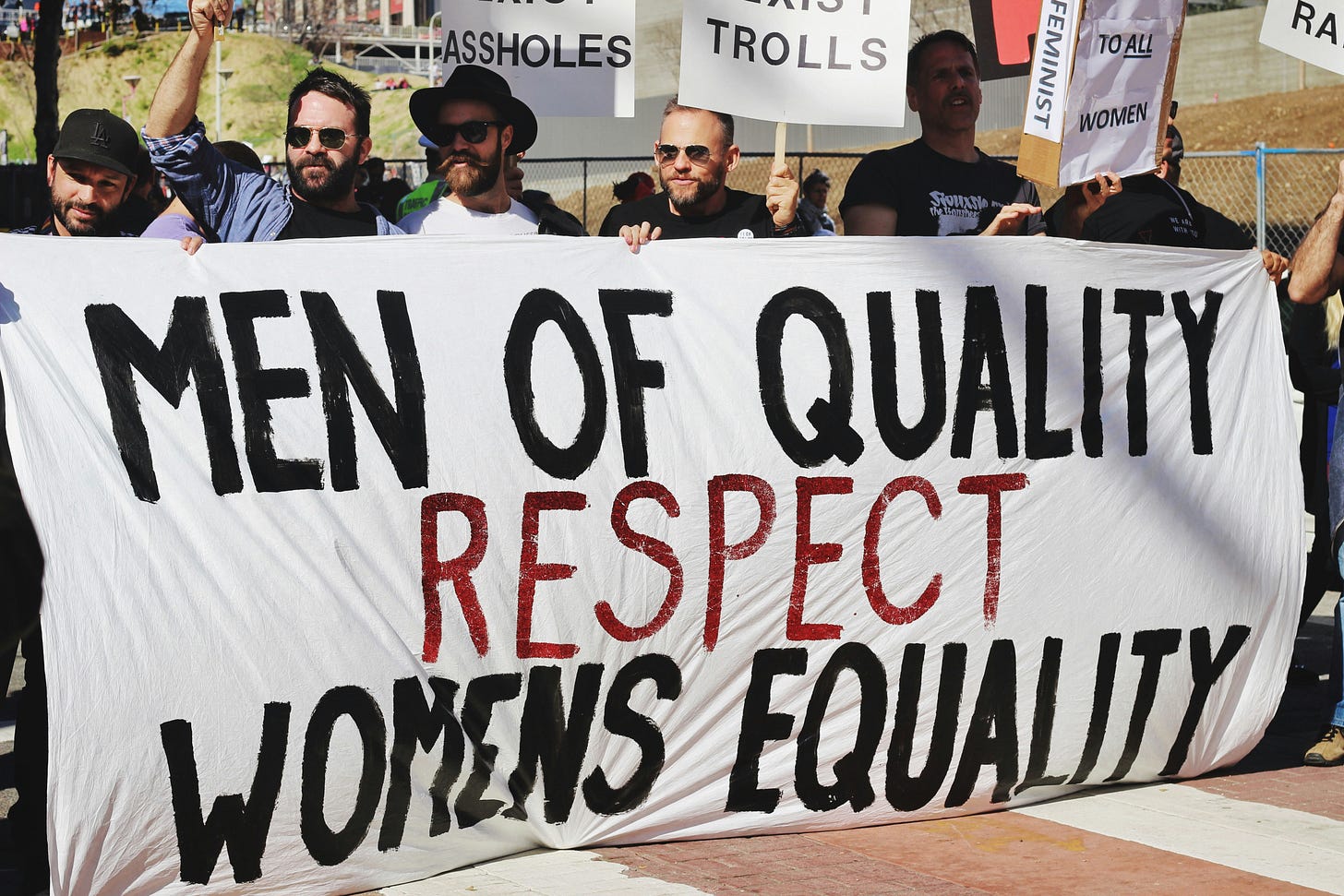How Fathers Should React to "Your Body, My Choice."
My first instinct is to challenge the words and pick a fight as I let my Southern Roots come out.

Shortly after the election, two men showed up at Texas State University with signs that contained homophobic slurs and one that declared women are property. This follows the bigger trend where your body, my choice has become a rallying cry for some. And although the phrase may have begun as a reaction by far-right trolls, it has moved into real-life everyday interactions.
“I feel like it’s a threat to a certain extent,” said Sidda Vogelsass, a sophomore at Texas State University, and also my niece. When asked if she thought it was trolling or a poor joke, she said “That doesn’t stop me from being scared that something could happen. It doesn’t mean that I feel safe.”
She’s not the only one who feels this way.
“I have to be careful about what I say because of what could be done to me as a minority and a woman. It restricts my own speech,” said Isabel Carpenter, a Texas State University junior and my other niece. As a woman of Hispanic descent, she takes your body, my choice, as a genuine threat. “It’s not just about baby issues; it’s about women’s rights issues.” Isabel then mentions the 4B movement, where women refuse to have any romantic involvement with men. “Rape will be on the rise, and these men are admitting to it, too.”
Where are the threats coming from?
The statement your body, my choice is a play on words from the pro-life movement of my body, my choice. Twisting the meaning is a common tactic used in the manosphere and by male influencers. There is a hierarchy that exists within boy culture where hate and cruelty are sold as masculine traits. Born out of loneliness, those on the bottom of the hierarchy use these taunts as a way to put themselves at the top and, thus, have more perceived value, even if that value is an illusion and fleeting.
“It is both dehumanizing and bullying,” said Dr. Grey Endres, associate professor of social work at Missouri Western State University. As a consultant for Newhouse KC, a domestic violence shelter, he deals with statements of violence daily. “And when we make people less than human, it makes it easier to say statements like your body, my choice. This is both an active and a passive threat.”
However, knowing why and how this happens doesn’t help fathers deal with the very real safety concerns that fathers feel for the women in their lives. To put it bluntly, I am concerned that my nieces and daughter are at a heightened risk of sexual assault.
What can fathers do to support their families through the threats?
“Fight or flight is hardwired into us, but we shouldn’t do either,” said Dr. Endres. The statement goes against what I feel as a father. I want to confront those who have used this as a rallying cry for their movement. My first instinct is to challenge the words and pick a fight as I let my Southern Roots come out. However, this is not what fathers should do, or at least not in the way that many of us may want to.
“My goal is not to add fuel to the fire,” advised Dr. Endres. “First, understand what triggers all of us. And then recognize when people talk that way, that it usually comes from a place of pain. Instead, respond with empathy.”
His advice at first gives me pause. It’s the exact opposite of what I want to do.
“And don’t confuse empathy with sympathy,” he states. “Ask instead, ‘Are you ok because I’m worried about you.’ This takes the air out of their sail.” Dr. Endres recommends not trivializing your feelings but validating them and then responding with kindness. “Those who want to hurt people are the ones that have been hurt.” That’s what he means by empathy and not sympathy. “And you can usually walk away and surround yourself with good people.” Dr. Endres does recognize that it can be very hard to do that.
I have spent a lot of my life as a father building connections with other dads. I believe that there is power in creating a community of men that I can rely on, and who can understand the struggles that we go through. With four other dads, we have raised 16 kids together so I can see the wisdom in Dr. Endres’s words. And I can also see the value in the words of my nieces.
I asked both Sidda and Isabel what actions they needed to see in the men in their lives.
“Tell the women in your life that you are not like that,” Sidda said. “Do everything in your power to show them that they are safe with you. Be reassuring and not just with me. But with everyone that comes to you and be open to discussion.”
“Take it seriously,” said Isabell. “A lot of men don’t realize how personal this is, and they don’t understand that there is mourning. Use empathy,” she said, echoing Dr. Endres’s words. “And then speak up and join your voice with the women’s voices in your life.”
It would seem that both my nieces are a bit more level-headed than their uncle. But I’m not surprised, as, after all, they are awesome, and I enjoy bragging about them. I hope that I’ve had at least a small part in framing their view of how the men in their lives should treat them. As equals and people, and not solely as a uterus that the term your body, my choice implies.


“What can fathers do to support their families through the threats?”
My initial reaction—learn:
-to not take shit
-self-love
-martial arts (for self defense, of course 😉 😜)